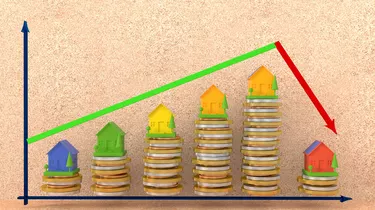
The U.S. housing market may be cooling down in some regions. In the next year, house prices, which have been skyrocketing, may fall or at least stay flat. Determining whether to buy or sell a home can be challenging. Knowing why home prices may fall can help.
Year-Over-Year Housing Increases
Video of the Day
A frenzy of homebuyers was released post pandemic, and the housing market exploded. According to the chief economist for CoreLogic, home prices in the U.S. had a double digit increase of 18.3 percent from June 2021 to June 2022.
Video of the Day
Last year, single family homes had a median sales price of $440,300. Mortgage rates were running around 3.2 percent. There was additional pressure on housing market because of low inventories. Contractors had pulled back during the pandemic so some regions were experiencing housing shortages. This drove home prices up further, and the asking price of a home became the final price with little negotiating.
But with inflation raging at 8.5 percent as of June 2022, the housing market may be reacting.
Economy Contracting
Homebuyers are beginning to pull back. Freddie Mac Chief Economist Len Kiefer tweeted in June that "the U.S. housing market is at the beginning stages of the most significant contraction since 2006."
According to the Mortgage Bankers Association, in June 2022, mortgage applications dropped to the lowest level in 22 years. Mortgage applications had also slumped in 2006, which indicated that the housing market would slow down.
But the difference between now and the 2000s is the types of loans issued. In the early 2000s, quite a few risky loans were made through Freddie Mac. This more than anything contributed to the housing crisis. As a result, restrictions are tighter in 2022. Still, home sales have slowed down. Unfortunately, homebuyers have not yet seen home prices drop. But with inventory expanding, they may.
In the next year, house prices, which have been skyrocketing, may fall or at least stay flat.
More Inventory Available
According to the Realtor.com, their forecast changed from anticipating a 0.3 percent rise in inventory to a 15 percent increase in inventory.
This could mean price declines for single family homes next year.
New construction is contributing to this influx of inventory. Real estate firm, Redfin said that more than one-third of homes for sale in December were new construction. The abundance of new inventory could affect home prices.
High Interest Rates
Trying to rein in inflation, the federal reserve increased interest rates from a low of 3.11 percent in December to 5.47 percent in August 2022. Mortgage rates followed suit. So, although the inventory has opened up, there may be fewer takers. High prices and high interest rates are enough to deter some homebuyers.
Vulnerable Regions Facing Falling Home Prices
Although in most of the U.S., it's anticipated that home prices will slow down to a 5 percent increase, there are some boom areas that are vulnerable to price drops.
Next year, the hot real estate market in Boise, Idaho may slow down. Inland parts of California and Salt Lake City, Utah may also see price cuts in single family homes. Another hot area poised for a slowdown is New York.
Buy or Sell Single Family Homes
Whether to buy or sell depends on your unique circumstances. But arm yourself with knowledge. A declining housing market could impact your home's value if you're a seller. You'll need to decide whether to wait it out for the next upturn or sell before the housing market goes down.
If you're a buyer, you need to analyze how much of your net income you want to devote to housing costs. Should you wait for lower house prices and risk higher interest rates? It depends on what your circumstances dictate.
- CoreLogic: U.S. Home Price Insight
- Fortune: The Housing Market in Entering the Most Significant Contraction in Activity Since 2006 Says
- New York Post: U.S. Home Prices to Sink by 2023 as Mortgage Rates Hit 6%
- Forbes: Housing Market Predictions 2022: When Will Prices Drop
- Forbes: A Recession Doesn’t Mean a Housing Crisis: Realtors Explain Why Housing Market Seems Unfazed by Economic Slowdown
- Forbes: The Housing Market Amid Recession Fears: Should You Buy Now or Wait?
- FRED Economic Data: Median Sales Prices of Homes Sold in the U.S.
- U.S. Inflation Calculator: Current Inflations Rates 2000-2022
- Realtor.com: July 2022 Monthly Housing Market Trends Report
- MBA: MBA Weekly Survey June 8, 2022